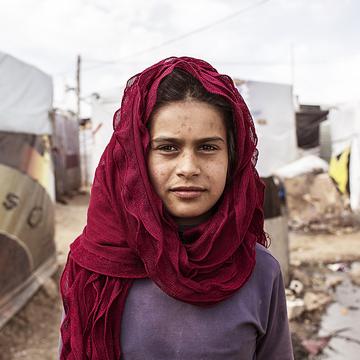
A 12-year-old Syrian girl, in the Anjar Refugee camp in Lebanon. ��ɫ��Ƶoffers programs in the camp to help keep refugee children healthy, educated and safe.
Humanitarian Response
Every child deserves a childhood – no matter who they are and where they live
Yet today, the number of children in humanitarian need has skyrocketed more than 20% since 2022 – the result of both protracted and new conflicts, a global hunger crisis, and natural and climate change-driven disasters, including devastating earthquakes and massive flooding.
- ��1 in 6 children live in a conflict zone.
- Over 150 million children around the world require urgent, critical humanitarian assistance to survive and thrive.
- 78.2 million school-aged children affected by crises are out-of-school.
- Girls affected by conflict are 20% more likely to marry as children than girls living outside of conflict settings.
U.S. global leadership and the U.S.’s long-standing commitment to humanitarian principles and values has never been more essential – for children’s futures and for U.S. foreign policy objectives on global peace, prosperity, and universal human rights.��
We urge the U.S. government to put the needs of children living in crisis settings at the heart of U.S. foreign policy, funding, and diplomacy efforts.
- FUNDING: Provide robust humanitarian funding to the core humanitarian accounts at no less than: $5.27B for International Disaster Assistance (IDA) and, $5.2B for Migration and Refugee Assistance (MRA). Increases in funding for the humanitarian accounts should not come at the expense of other global health, global development, or poverty-focused accounts.
- PRINCIPLED HUMANITARIAN ACTION: Protect humanitarian principles, humanitarian space, and humanitarian access to children in need, and ensure counterterrorism efforts and political accountability tools do not impede humanitarian assistance or further drive humanitarian needs.
- ��
- EDUCATION IN EMERGENCIES: Prioritize safe, quality access to education for all children living in emergency settings in the first phase of the response. Education is a lifeline for children and cannot be delayed.
- Continue robust U.S. funding and political support for Education Cannot Wait, the global fund for education in emergencies.
- Call on the Administration to ensure critical education in emergencies interventions for internally displaced children and refugee children through U.S.-funded responses.
- MENTAL HEALTH AND PSYCHOSOCIAL SUPPORT: Co-sponsor the bipartisan and bicameral MINDS Act (S.767/ H.R. 1570) to ensure support for children impacted by crises with the immediate and long-term mental health and psychosocial interventions they need.
